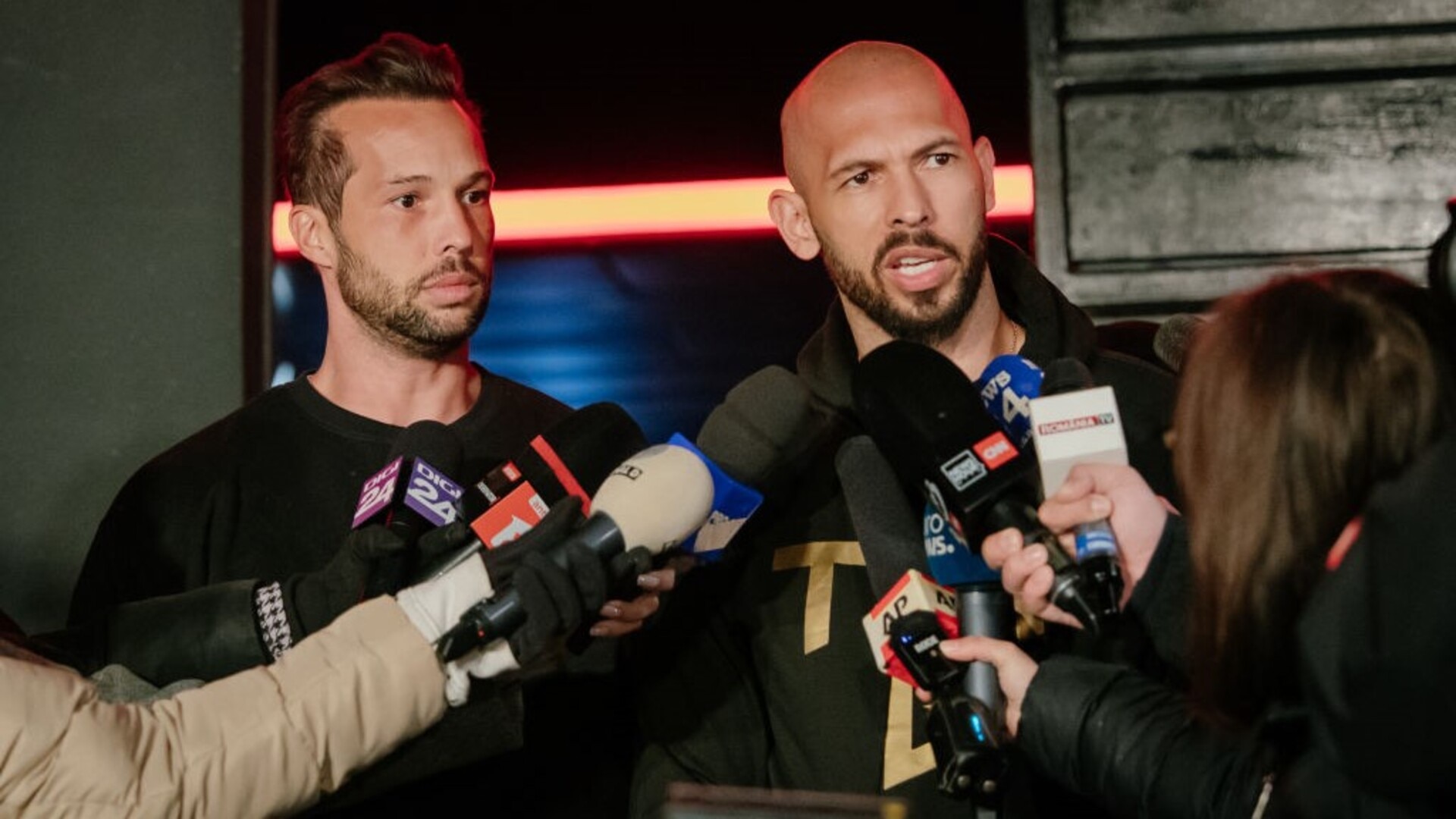Stars of Channel 10’s The Project have warned Australian parents about the “terrifying” repercussions of their sons being exposed to social media content by influencers like Andrew Tate.
Channel 10’s The Project stars have warned Australian parents about the trend of young men turning to notorious toxic masculinity influencers like Andrew Tate and manosphere culture.
Georgie Tunny, Susie Youssef and Waleed Aly shared their concerns on Thursday, a day after a Movember report found most young men in Australia (68 per cent) are turning to toxic masculinity influencers like the British-American former kickboxer for motivation.
Tate has faced legal charges, including human trafficking and rape, which he denies, and his controversial commentary has resulted in his expulsion from various social media platforms amid concerns he actively promotes misogyny.
About 27 per cent of the men who regularly engage with content like Tate’s feel “worthlessness” despite also reporting feeling motivated while watching the content, according to the Movember report.
Tunny told her co-panellists she did not know if being the parent of a young boy or a young girl navigating the world was more “terrifying”.
“You are constantly being told to be careful, you’ve got to protect yourself, and ‘men bad’, ‘boys bad,’ and they are the enemy in a way,” she said.
“But then, is it more terrifying to be parents to a young boy who’s got the same images and rhetoric flying at him?”
The 34-year-old questioned where “the positive role models” for young men are in society.
Susie Youssef. Picture: Supplied
“Why are they (influencers) constantly calling out the negative ones?” she said.
Youssef, 41, conceded there are not enough positive male role models who are masculine as queer children and those transitioning question who they are being influenced by.
“There’s such a broad spectrum here toward gender and sexuality, and it’s heartening in a way to see young men questioning the role models they’ve been provided with,” she said.
“But also, where are the positive male role models that are masculine?
“What does that look like? I don’t begin to have the answers but it does feel like there’s a gap here.”
Aly said Australian online culture does not have a positive way of talking about masculinity.
“Does our culture have a way of talking about masculinity that is celebrating it?” he asked.
“I think the answer to that right now is ‘no’.”
The Movember Institute of Men’s Health surveyed more than 3,000 men aged 16 to 25 in Australia, the UK, and the US to see how masculinity influencers’ content impacted their lives.
On Wednesday, Movember men’s health research global director Dr Zac Seidler said they largely generated feelings of distress.
BATH, UNITED KINGDOM – AUGUST 01: In this photo illustration the logo of US online social media and social networking site ‘X’ (formerly known as Twitter) is displayed centrally on a smartphone screen alongside that of Threads (L) and Instagram (R) on August 01, 2023 in Bath, England. On the top row the logo of online video sharing and social media platform YouTube is seen alongside that of Whatsapp and TikTok. Along the bottom row Facebook, Quora amd Messenger are displayed. Elon Musk recently revealed the new logo for Twitter, which constitutes the letter ‘X’ as part of a rebrand of the company. (Photo by Matt Cardy/Getty Images)
“They tell us that they feel empowered, like they’re enjoying and feeling motivated by this content, and yet those who watch more are fundamentally far more distressed than those who don’t,” Dr Seilder told ABC News.
In addition, Melbourne’s Monash University Professor Steven Roberts and Dr Stephanie Wescott recently analysed more than 2,200 posts by Tate on his website and the Telegram messaging platform from 2019 to 2024.
The experts found about 90 per cent of Tate’s posts on his website and Telegram account focused “on advancing particular projections of what he views as the ideal manifestation of manhood and masculinity.”
Tate also attacked boys and men who don’t fit “his very rigid interpretation of masculinity” more commonly than he projected sexist views on women.
News
Renovations on hold! The Block couple’s secret baby joy goes public in a huge reveal
The Block’s Emma and Ben announced on the show last night that they are expecting a baby. One of the…
My Kitchen Rules explodes back: sugar, spice… and a grenade (or two) in every course
Manu Feildel and Colin Fassnidge are great mates. The two chefs and My Kitchen Rules hosts even refer to themselves as “brothers”….
‘It’s hard,’ Sonny admits through tears — the burden he’s been carrying and how The Block might rewrite his future
The Block‘s Sonny wasn’t expecting to break down after a pre-start meeting Friday morning. Leading the meeting were Daniel Allen and…
“Everyone Was Yelling at Me”: Shelley Craft Halts the Freedom Challenge to Scold a Contestant — and the REAL reason will shock you
You’d never expect The Block’s sweetest host Shelley Craft to scold one of the contestants but she did, just not for the reason you…
HEARTWRENCHING MOMENT: MAFS Star Breaks Down Announcing Pregnancy After TRAGIC Miscarriage – ‘It’s a Mix of Emotions!’
Married At First Sight star Beck Zemek has broken down in tears after revealing she is pregnant with her second child. Beck…
Shocking Fashion Faux Pas! Controversial Influencer Steals the Show with Outrageous Entrance at Australian Fashion Week, Then Stuns in Lilac Gown at Les Misérables Premiere!
Controversial influencer Jamie Azzopardi has once again become the talk of the town. Azzopardi, who is non-binary and uses they/them pronouns,…
End of content
No more pages to load















